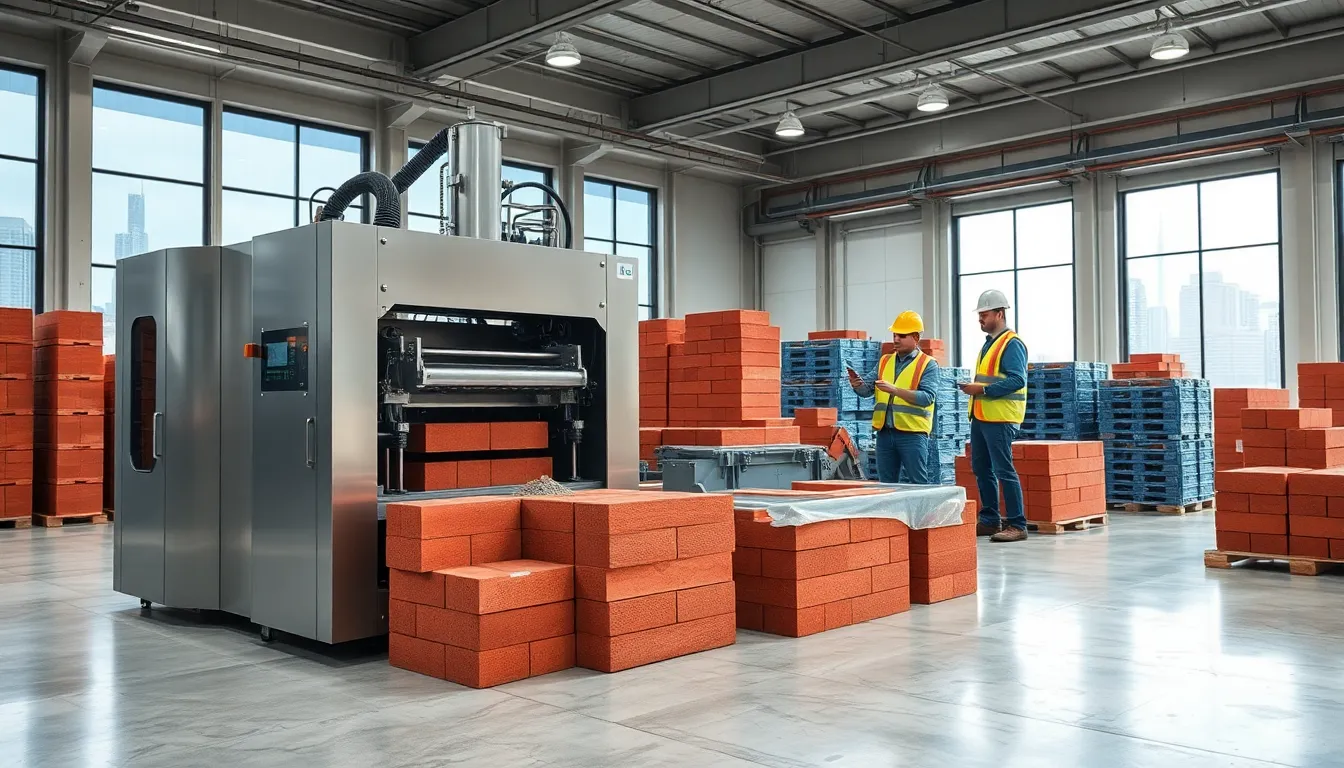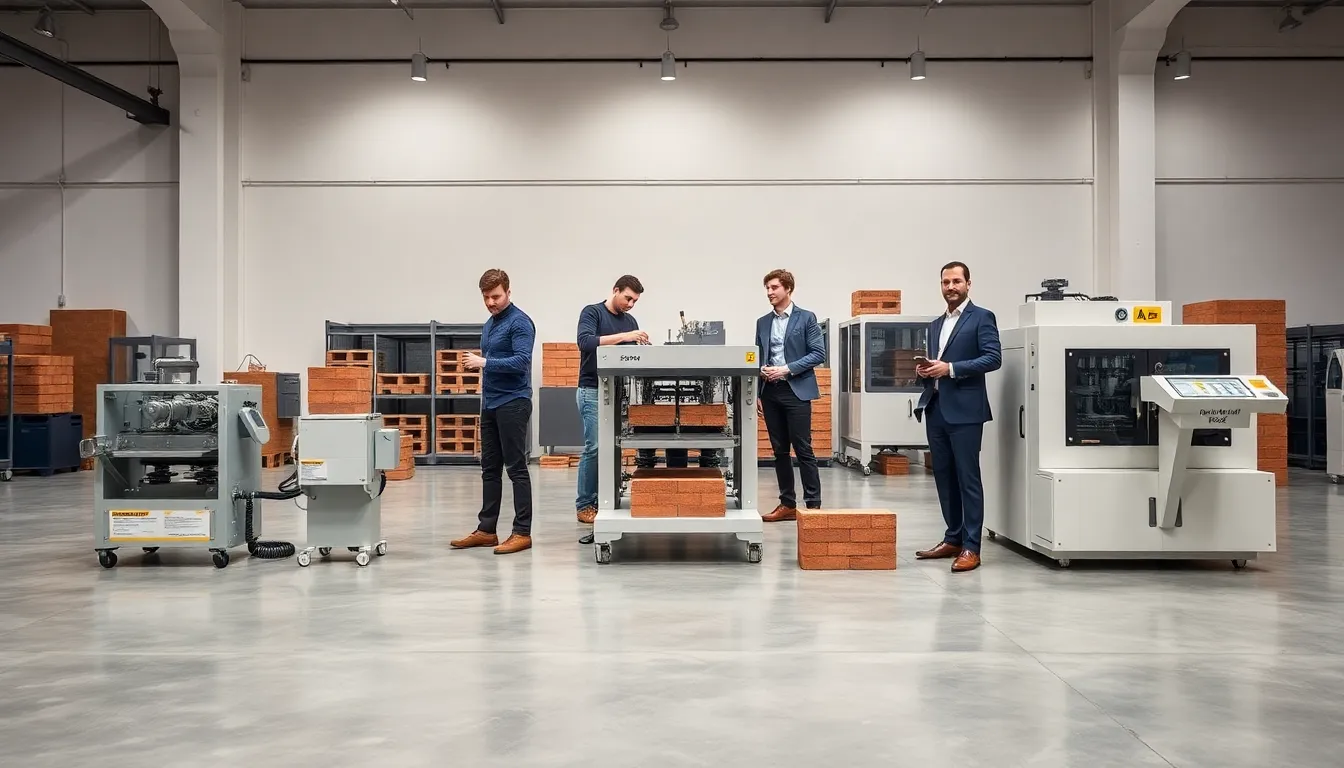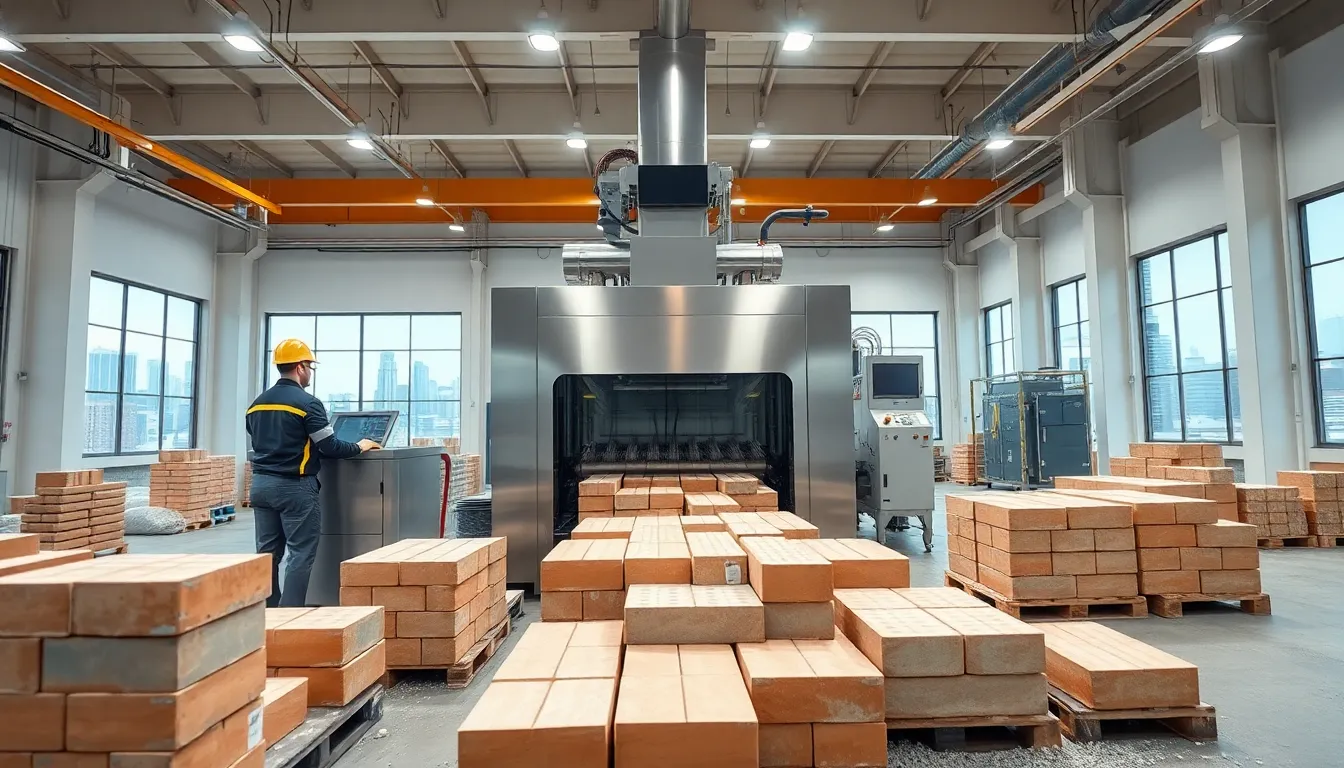A brick making machine automates the production of uniform construction bricks through compression and moulding of raw materials including cement, sand, clay, and fly ash, available in manual, semi-automatic, and fully automatic configurations. Manufacturers like Block Machine Lontto Brick Making Machine in Chicago provide equipment with varying production capacities, mould flexibility, and advanced control systems to suit different operational scales and budgets. When selecting a machine, construction businesses should evaluate production requirements, power availability, automation level, durability, after-sales support, and scalability to ensure efficient brick manufacturing with reduced labour costs and consistent quality output.
Key Takeaways
- A brick making machine automates brick production to deliver consistent, high-quality bricks efficiently for construction businesses.
- There are manual, semi-automatic, and fully automatic brick making machines, each suited to different production needs and budgets.
- Key features to assess include production capacity, power requirements, automation level, mold flexibility, durability, and advanced control systems.
- Brick making machines can work with various raw materials such as cement, sand, clay, fly ash, and gravel to create specialized bricks.
- Investing in a brick making machine reduces labor costs, increases output, and ensures uniform brick quality for competitive advantage.
- Before purchasing, consider production needs, budget, workspace, industry standards, after-sales support, and future scalability.
What Is a Brick Making Machine?

A brick making machine is a specialized piece of construction equipment designed to shape and compress building materials into uniform bricks or blocks. These machines greatly increase productivity and standardize the size and quality of bricks used in construction, compared to manual production methods. In cities like Chicago, Lontto provides advanced brick making machines that support efficient and large-scale manufacturing for contractors and building suppliers.
Types of Brick Making Machines

Brick making machines are available in multiple configurations to match different production requirements and budgets. Understanding the differences helps buyers select the equipment that best fits their needs.
Manual Brick Making Machines
Manual machines require significant physical effort to operate. They’re usually lever-based or hand-pressed, making them suitable for smaller operations or sites with limited access to electricity. Typically, a manual brick making machine produces fewer bricks per hour, but it is cost-effective and easy to maintain.
Semi-Automatic Brick Making Machines
Semi-automatic machines combine some manual input with powered assistance. Operators load raw materials, and the machine automates processes such as pressing and ejecting the finished bricks. These machines are ideal for medium-sized construction businesses looking for consistent output without the higher cost of fully automatic systems.
Fully Automatic Brick Making Machines
Fully automatic machines handle the entire process, from material feeding to shaping, pressing, and stacking bricks, without manual intervention. These systems are equipped with advanced controls and sensors, resulting in higher production rates and minimal labor. Lontto, for instance, supplies fully automatic brick making machines in Chicago that are suitable for large commercial factories aiming for maximum efficiency and output.
Key Features to Consider
When investing in a brick making machine, it’s important to evaluate several key features:
- Production Capacity: Determine how many bricks or blocks the machine can produce per cycle or per hour. Lontto offers models with a wide range of output levels suitable for both small workshops and major manufacturing plants.
- Power Requirements: Machines can be manually operated or rely on diesel, hydraulic, or electric power. Buyers should verify compatibility with their site’s power supply.
- Automation Level: The choice between manual, semi-automatic, and fully automatic machines will impact labor needs and overall productivity.
- Mold Flexibility: Some machines can quickly swap out molds to produce different brick shapes and sizes. This adds versatility for diverse project demands.
- Durability and Maintenance: Machines built with robust materials and accessible parts reduce downtime and operating costs. Lontto‘s machines are known for their long service life and straightforward maintenance routines.
- Control Systems: Advanced models often feature programmable logic controllers (PLCs) and touch screen interfaces, offering intuitive operation and quality consistency.
Raw Materials Used in Brick Making Machines
Brick making machines can process a range of raw materials depending on the intended final product. The most common options include:
- Cement: A binding agent, essential for high-strength concrete blocks and pavers.
- Sand: Used as a filler and structural component.
- Clay: Often used in traditional fired brick production.
- Fly Ash: A byproduct of coal combustion, valued for sustainability and lightweight properties.
- Gravel or Crushed Stone: Added to increase density and durability.
- Water: Necessary for mixing and activating cement or clay.
Lontto machines in Chicago support many material blends, allowing manufacturers to produce bricks tailored to specific structural or aesthetic needs.
Step-By-Step Brick Production Process
The brick production process is systematic and consists of distinct stages, which may vary based on the type and automation level of the machine:
- Preparation of Raw Materials: Materials such as cement, sand, and aggregates are carefully measured and mixed to achieve the desired composition.
- Feeding: The prepared mixture is transferred into the brick making machine’s hopper or mixing chamber.
- Compression and Molding: The machine compresses the mixture into pre-designed molds, forming the bricks under high pressure. Fully automatic machines, such as those supplied by Lontto, perform this step rapidly and precisely.
- Curing: Freshly formed bricks are stacked and cured, often by air-drying or steam curing, to maximize their strength.
- Packaging and Storage: Once cured, bricks are packaged for transport or stored for site delivery.
This process helps maintain uniformity and ensures each brick meets building standards.
Benefits of Using Brick Making Machines
Choosing a brick making machine brings several operational and financial advantages:
- Labor Savings: Automated or semi-automated machines drastically reduce manual labor requirements.
- Consistent Quality: Mechanized molding guarantees uniform shape, density, and strength for each brick, meeting project specifications.
- Higher Output: Manufacturers can achieve much higher production volumes than with manual hand-pressed methods.
- Material Efficiency: Precise measurements and controlled mixing mean less waste.
- Cost Reduction: Over time, reduced labor and material waste lead to lower production costs.
- Environmentally Friendly Options: Machines like those from Lontto in Chicago can be configured for eco-friendly brick types, such as those made from fly ash or recycled materials.
For growing construction businesses, these benefits lead to improved competitiveness and profitability.
Factors to Consider Before Buying a Brick Making Machine
When evaluating brick making machines, buyers should keep several decision factors in mind:
- Production Needs: Calculate daily or monthly brick requirements.
- Budget Constraints: Assess the long-term value versus upfront cost of manual, semi-automatic, or fully automatic machines.
- Available Space: Ensure the machine fits in the intended workspace, considering space for raw material storage and finished brick handling.
- Quality Assurance: Check for machines that comply with local industry standards and certifications.
- After-Sales Support: Reliable technical support and spare parts availability is crucial. Lontto provides dedicated support for clients in Chicago and neighboring regions.
- Scalability: Businesses planning to expand should opt for machines that can accommodate increased volume or upgraded automation later.
Comparing features and services allows buyers to select a machine that will serve their operation with reliability and efficiency.
Lontto
Lontto is a manufacturer specializing in block and brick making machines, offering a range of products including concrete block machines, mobile block making machines, and compressed earth block machines. They provide services such as installation and training to ensure efficient operation of their equipment.
Contact:
Chao Zhang, CEO
Phone: 708 260 8300
Email: lontto66@gmail.com
Website: www.block-machine.net
Location:
4992 S Austin Ave, Chicago, IL 60638, USA
Frequently Asked Questions About Brick Making Machines
What is a brick making machine and how does it work?
A brick making machine is specialized equipment that shapes and compresses raw materials like cement, sand, or clay into uniform bricks. The process involves mixing, feeding, molding under pressure, curing, and then packaging, enabling efficient and consistent brick production for construction projects.
What types of brick making machines are available?
There are three main types: manual, semi-automatic, and fully automatic brick making machines. Manual machines require physical labor, semi-automatic machines combine manual loading with automated pressing, and fully automatic machines handle the entire process with minimal human intervention.
Which raw materials can be used in a brick making machine?
Brick making machines can process cement, sand, clay, fly ash, gravel, crushed stone, and water. The recipe depends on the desired brick’s structural and aesthetic properties. Some machines can handle specialized mixes for eco-friendly or lightweight bricks.
How do I choose the best brick making machine for my business?
Consider production capacity, power requirements, automation level, mold flexibility, durability, and after-sales support. Assess your daily or monthly output needs, workspace, budget, and plans for future expansion to ensure you select a machine that fits your business.
Why should I invest in an automatic brick making machine instead of a manual one?
Automatic brick making machines offer higher production rates, require less labor, and deliver consistent quality. While they have a higher upfront cost, their efficiency, material savings, and lower long-term operating expenses make them a smart investment for growing businesses.
Can a brick making machine produce different sizes or shapes of bricks?
Yes, many modern brick making machines offer mold flexibility. This means you can swap out molds to produce various brick shapes and sizes, allowing your production line to adapt to different construction or design requirements.
